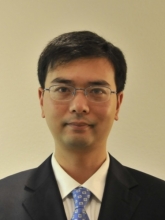CEE Seminar: Novel Materials and Devices for Sustainable Water and Energy

Postdoctoral Scholar
Linde+Robinson Laboratory
California Institute of Technology
Abstract: Providing sustainable water and energy globally is a great challenge. Xing's research has been focused on developing environmentally friendly technologies and strategies that decrease cost and increase the sustainable supplies of clean water and clean energy. This presentation will introduce several examples of novel materials and devices for water and energy applications, including multi-scale porous 3D electrodes for electrochemical energy devices (e.g., microbial fuel cells, super capacitors, Li-ion batteries, etc.), solid-state intermediate electrodes for electricity generation and hydrogen production from dilute organic matter, magnetic silver nanoparticles and nanowire-assisted electroporation for water disinfection, and mono-disperse super-absorbent polymer beads for microbial detection and quantification.
Bio: Xing Xie is currently a postdoc at the California Institute of Technology. He received his Ph.D. in 2014 from the Department of Civil & Environmental Engineering at Stanford University, where he also received a master's degree in materials science & engineering. His research interests are applications of environmental biotechnology and materials science at the nexus of water and energy. He has worked on many projects related to water treatment and reuse, microbial detection and quantification, energy and resource recovery, and energy storage. He has published more than 30 peer-reviewed articles, including one in PNAS, one in Nature Communications, and seven in Energy & Environmental Science. He also has contributed to one book chapter and six patent applications. His work has been cited over 2600 times with a H-index of 17. He received the Graduate Student Award in Environmental Chemistry from the American Chemical Society in 2012 and the Student Award from the Sustainable Nanotechnology Organization in 2013. Xing recently accepted a tenure-track faculty position at Georgia Tech and will start his assistant professor appointment in spring of 2017.
Share
Download
Upcoming Events
-
EECS Seminar: Less Compute, More Intelligence – Efficient and Autonomous Generative AI and Agents
-
MAE 298: Microscopic Robots that Sense, Act and Compute
-
CBE 298 Seminar: Interface Modification for Electrocatalysis
-
CEE Ph.D. Defense Announcement: Machine Learning and Remote Sensing for Environmental Modeling - From Large-Scale Streamflow Forecasting to Malaria Risk Mapping
-
CBE Special Seminar: Operando Electrochemical Methods at Dynamic Energy Materials Interfaces
